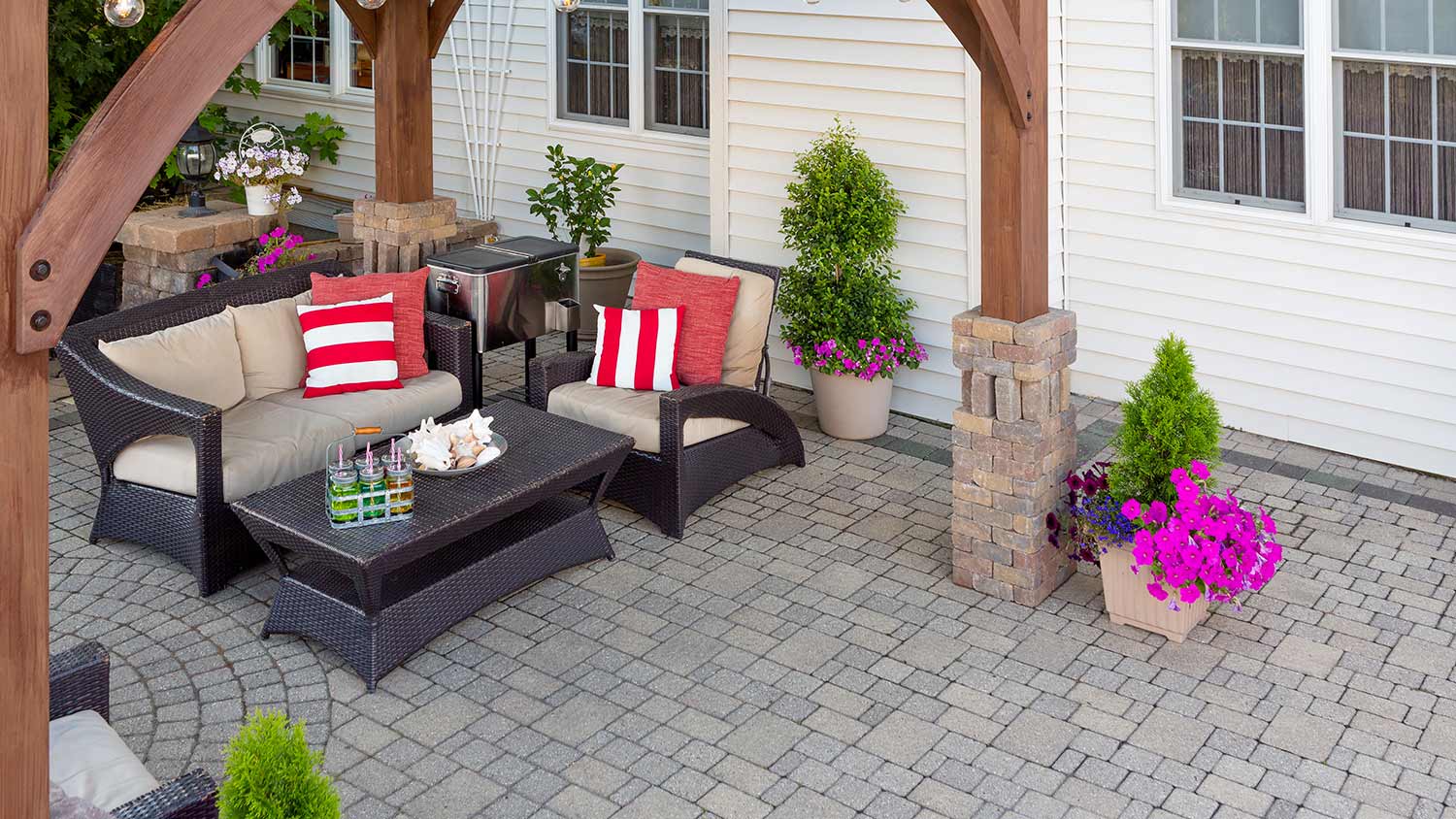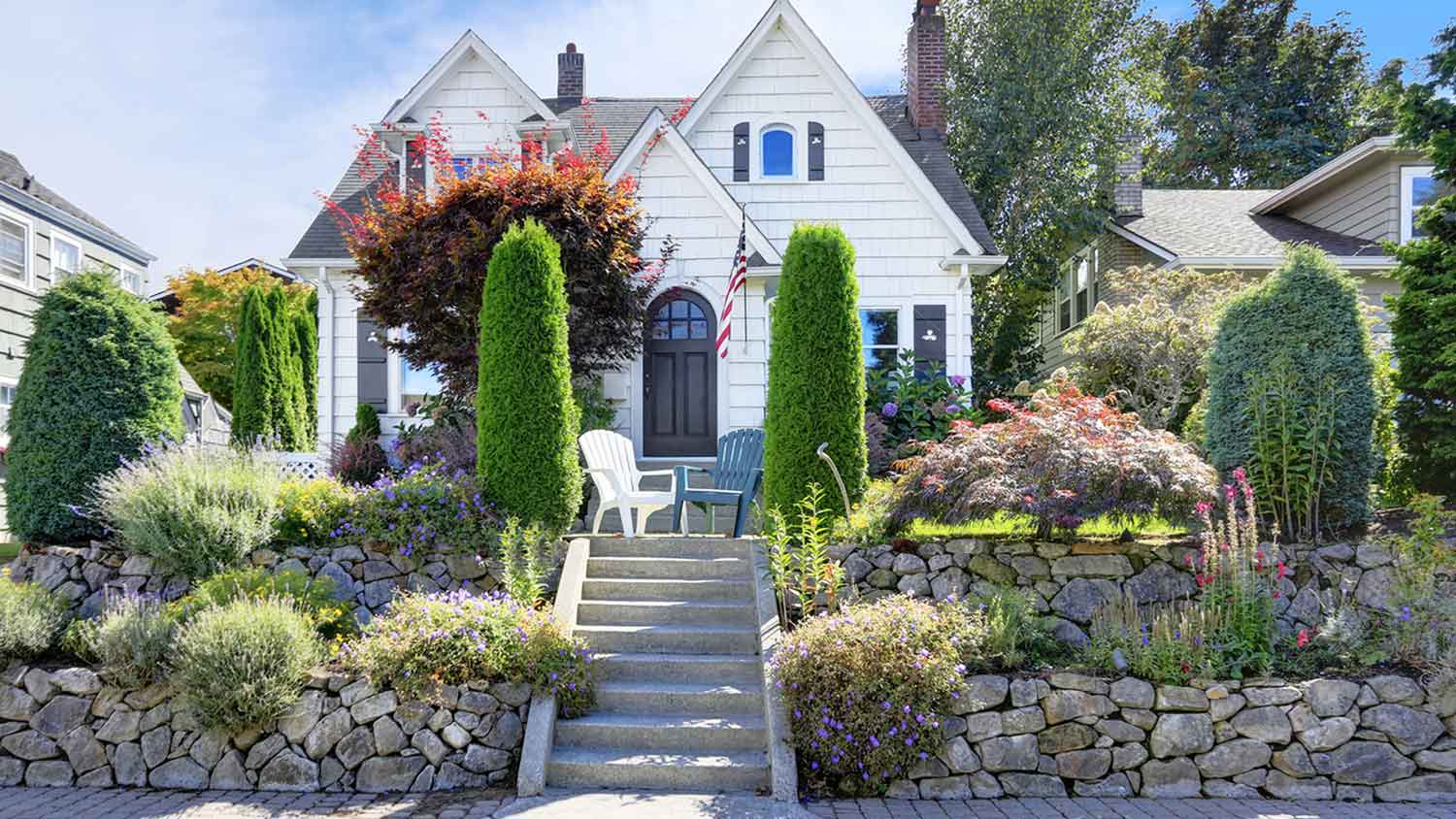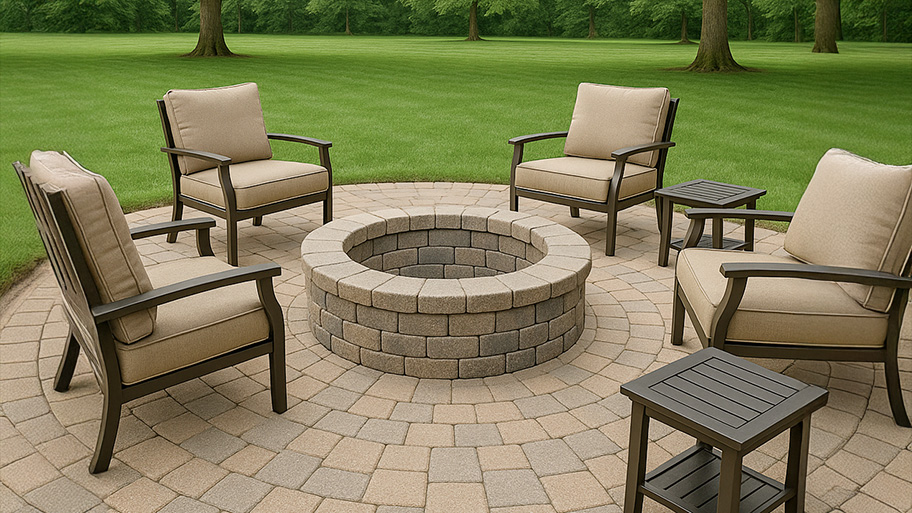
Pea gravel is a good-looking, versatile landscaping stone that's a favorite of the pros. Read about how much pea gravel costs for both installation and the stone itself.
Pavers and hardscaping service costs depend on your project and location. Check with a local pro for your specific job.
Indoor interlocking pavers range between $20 to $30 per square foot, while exterior interlocking pavers run from $8 to $25 per square foot.
Customized interlocking pavers are higher-end, ranging from $20 to $50 per square foot.
You can expect to pay between $50 and $80 per hour for professional installation.
Your paver project may require permits, which average $150 to $2,000 based on your location and the complexity of the project.
Durable, beautiful, and good for all climates—those are just a few of the advantages that come to mind when homeowners install interlocking pavers in their outdoor living spaces. Whereas concrete serves a primarily functional purpose, good paver design can help a patio pop. The question is, how much will they set you back? Learn the cost of interlocking pavers in this informational guide.
The average cost to install interlocking pavers is $3,400. Pavers increase in price when you opt for higher-end materials or customization, but a 60-square-foot area can be covered for as little as $350. Concrete stone or brick pavers are the two most popular options and cost roughly the same.
Not all pavers are created equally. Consider these three types of interlocking pavers for your build.
| Type of Paver | Typical Installation Cost Per Square Foot |
|---|---|
| Outdoor pavers | $8–$25 |
| Indoor pavers | $20–$30 |
| Customized pavers | $20–$50 |
Concrete, natural slate, and clay bricks are the three most popular types of interlocking pavers. When most people picture their finished paver project, they're picturing one of these materials laid beautifully in their yard. These range from $8 to $25 per square foot.
But homeowners may also look at alternative pavers products, such as rubber, which costs $6 to $11 per square foot. With a more forgiving surface, rubber pavers are great for the elderly who may risk falling, or child play areas.
Fewer homeowners may realize that indoor interlocking pavers also exist. Certain materials, especially marble, make a sleek and elegant design for indoor projects. Marble, because it stains easily, isn't suited for outdoor spaces.
Expect to pay on the higher end ($20 to $30 per square foot) for marble.
At higher price points, the sky sort of becomes the limit as far as customization goes for your interlocking pavers project. You might pay anywhere from $20 to $50 per square foot, depending on the material.
Some customization options you might choose to make your pavers projects truly your own:
Colors: red, teal, brown, etc.
Shapes: hexagon, dumble, zigzag, basil
Some homeowners even have certain pavers engraved or shaped in specific ways to give their home unique flair.

When shopping, here are some price points to consider for interlocking pavers.
| Paver Style | Typical Cost Range Per Square Foot |
|---|---|
| Concrete stone | $8–$15 |
| Natural slate or stone | $15–$50 |
| Concrete brick | $8–$15 |
| Clay brick | $10–$20 |
Concrete is probably the most popular material builders work with. Expect to pay $8 to $15 per square foot.
$15 to $50 per square foot is the price range for slightly more elegant stone builds.
Specialty paver companies may also work with flagstone, marble, or other types of natural stone.
If you like the color of natural brick but the durability of concrete (many homeowners do), you can get the best of both worlds. Again, $8 to $15 per square foot is an acceptable price range.
Most natural brick is made out of clay, limestone, and other materials. It'll cost slightly more than concrete brick ($10 to $20 per square foot) but give your outdoor living space a different aesthetic.
The cost to install interlocking pavers can depend on a few other factors as well, including the following:
Installing interlocking pavers can be challenging work. Unless you’re an experienced DIYer or a contractor yourself, we recommend hiring a highly rated paver installer near you. Rates can depend on the time of the year, where you live, and the complexity of the install, but budget to spend between $50 and $80 an hour (or $4 to $11 per square foot) for professional installation.
Depending on where you live and the extent of your paver project, you may need to obtain a permit before completing the work. On average, a construction permit costs between $150 and $2,000. Installing interlocking pavers, whether indoors or outdoors, should be on the low end of that range.
Where you live can impact the overall cost to install interlocking pavers. Location impacts both material costs and labor rates. Areas with higher costs of living, such as highly urban areas or coastal locations, generally result in higher costs. That said, a remote home in a rural area may mean less competition, so paver installers can charge more.
The location of the paver project within your home can also impact the cost. If it’s in a difficult-to-reach spot on your property, expect the project to take longer, which can increase labor costs.
Labor costs may also go up depending on the design complexity. If you envision a unique pattern for the installation, it will require the professional pavers to take more time, and they typically base labor prices on the project's length.
“Keep in mind, straight lines are always more affordable and easier to install than curved layouts, which add time for all the special cutting required,” says Matt DiBara, Angi Expert Review Board member and owner of DiBara Masonry.
Hiring a local contractor costs more upfront, but you benefit from faster results, less risk of damage, and a professional finish. Pros bring specialized equipment and experience to a project, making the process smoother and often saving you money in the long run.
Hiring a local contractor to install interlocking pavers ensures a proper, long-lasting installation. Here are some of the top reasons to work with a pro:
Contractors know how to properly grade the site and compact the base, which is crucial for preventing water damage, shifting pavers, and long-term failure.
Pros have access to commercial-grade tools like plate compactors and levels that ensure a smoother, more durable finish than basic DIY kits.
A professional installation minimizes the risk of common mistakes like incorrect measurements or poor site preparation, which can be costly and time-consuming to correct mid-project.
Most local contractors offer warranties on their workmanship, protecting your investment against defects or future issues that a DIY project would not be covered for.
If you want to take on some aspects of the project yourself, here are a few DIY tasks that can help save time and labor costs:
Remove objects, furniture, or debris from the installation site before the pros arrive to save on prep time.
Work with a designer to finalize your design and finish choices early on so you understand the entire scope of your project.
Have old flooring removed ahead of time to allow contractors to start with a blank slate.
Do any necessary paint touch ups on walls or baseboard yourself when the project is complete.
Discuss paver patterns, colors, and materials to ensure they meet your aesthetic and functional needs.
Determine the required drainage for the area to prevent problems in the future.
Ask about the type of edge restraint they plan to use, including plastic on concrete, and why.
Inquire if they are able to check soil conditions, especially if you have clay soil which may require a deeper base.
Get a clear estimate for the total project including a best- and worst-case scenario timeline.
Home is the most important place on earth, which is why Angi has helped more than 150 million homeowners transform their houses into homes they adore. To help homeowners with their next project, Angi provides readers with the most accurate cost data and upholds strict editorial standards. We extensively research project costs to develop the pricing data you see, so you can make the best decisions for you and your home. We rely on reputable sources, including the U.S. Bureau of Labor Statistics, academic journals, market studies, and interviews with industry experts—all to ensure our prices reflect real-world projects.
Want to help us improve our cost data? Send us a recent project quote to [email protected]. Quotes and personal information will not be shared publicly.
From average costs to expert advice, get all the answers you need to get your job done.

Pea gravel is a good-looking, versatile landscaping stone that's a favorite of the pros. Read about how much pea gravel costs for both installation and the stone itself.

Discover travertine pavers costs to learn about installation, materials, and labor prices, plus tips to save on your travertine paver project.

Retaining wall repair cost can vary widely based on the age and condition of the wall being restored. Learn why finding the right pro is important for getting the job done.

Interlocking pavers fit together easily, like puzzle pieces, using the power of friction to disperse weight, making them ideal for driveways and walkways.
.jpeg?impolicy=leadImage)
Pavers are a popular option for homeowners redoing their hardscaping. Learn everything you need to know about what pavers are in this guide.

Adding certain types of hardscape features can add value to your home. These are the projects that will get you the biggest return on your investment.